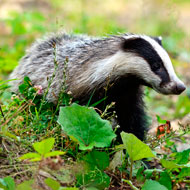RAU testing confirms effectiveness of the Badger Beater

RAU say that there were no successful attempts from badgers to access the mineral lick held by the Badger Beater - despite the use of peanuts to further entice them.
A study by the Royal Agricultural University (RAU) has found that badger-proof feeders successfully prevent badgers accessing mineral lick buckets and blocks.
The three-month trial assessed the effectiveness of the Badger Beater feeder. Made by Rumenco Ltd, it has been designed to reduce potential contact between badgers and cattle in an attempt to potentially reduce the spread of bovine TB.
The Badger Beater holds blocks, buckets and tubs off the ground to reduce badger contact with mineral licks and stands at the Defra recommended height of one meter.
The feeder was tested at the University's Manor Hill Farm at Harnhill - chosen due to its proximity to an active badger sett. A control measure and the Badger Beater were baited with peanuts, and the badger interaction was filmed using infra-red cameras. It was also trialled with cattle to ensure that it was practical and durable.
During the course of the trial, RAU say that there were no successful attempts from badgers to access the mineral lick held by the Badger Beater - despite the use of peanuts to further entice them.
Dr Rhiannon Naylor, lecturer in rural land use and management at the RAU, said: “Based on our results we are pleased to confirm that, during the trial period, the Badger Beater successfully prevented badger access to mineral lick buckets. Biosecurity at grazing is particularly difficult, but this measure provides farmers with an additional tool to minimise the contact between badgers and cattle.”



 HMRC has invited feedback to its communications regarding the employment status of locum vets and vet nurses.
HMRC has invited feedback to its communications regarding the employment status of locum vets and vet nurses.